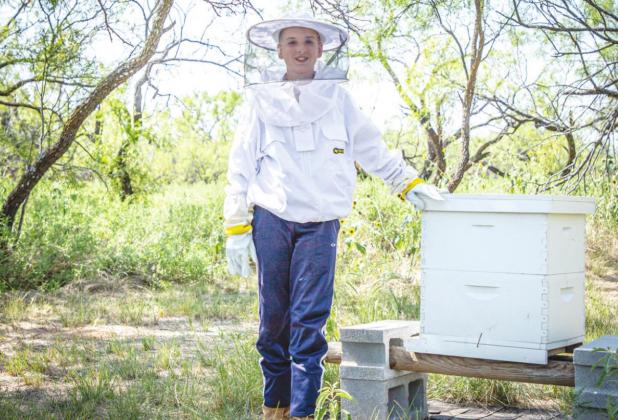
Young Entrepreneurs: Colby the Beekeeper
Young business entrepreneurs continue to grow in Olney. The next one we are featuring is Colby Johnson, the middle son of Dr. Jeremy Johnson and wife Trina. Johnson has selected beekeeping as his new hobby, that he describes as fun.
“I realized that the plants were not doing so [well], and I knew that the bees could greatly help the wildflowers and plants such as the wild plum plants,” Johnson stated as one of the reasons he took on beekeeping.
In addition to helping plants, Johnson plans to harvest the honey later to sell at the Graham Farmers Market. There are many reasons local farmers markets opt to sell local honey.
The Mayo Clinic said, “Honey produced by local bees can help with allergies, if the honey consumed is produced by bees local to the area in which you live. Honey has been anecdotally reported to lessen symptoms in people with seasonal allergies.”
Also, according to the Mayo Clinic, honey has been evaluated as an aid to suppress coughing and anti-inflammatory effects.
Moreover, bees are essential to the world’s food supply because they are excellent pollinators, Johnson said.
“[Bees] pollinate 30 percent of the world. So, it’s important not to kill the bees. [Instead,] you can have someone remove them, and they usually don’t charge you anything,” Johnson added.
According to canr.msu.edu/native plants/pollination, “Bees make excellent pollinators because they spend most of their lives collecting pollen, a source of protein that they feed to their developing offspring. When a bee lands on a flower, the hairs all over the bee’s body attract pollen grains through electrostatic forces. Stiff hairs on their legs enable them to groom the pollen into specialized brushes or pockets on their legs or body and then carry it back to their nest. Individual bees tend to focus on one kind of flower at a time, which means it is more likely that pollen from one flower will be transferred to another flower of the same species by a particular bee. Many plants require this kind of pollen distribution, known as cross-pollination, to produce viable seeds. The business of collecting pollen requires a lot of energy. So many flowers attract and also reward bees with nectar, a mixture of water and sugars produced by plants.”
